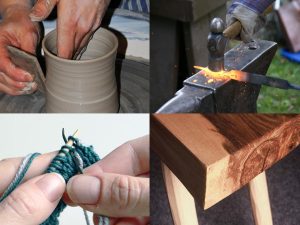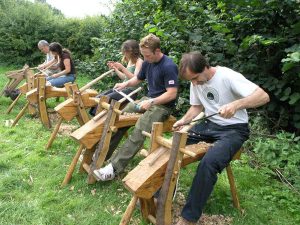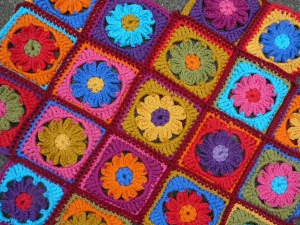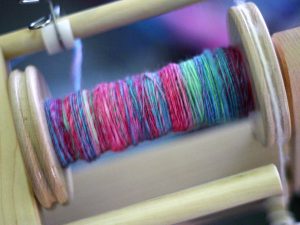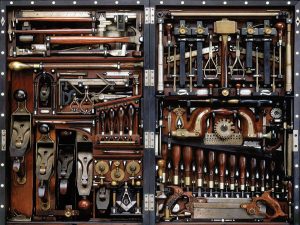How many people do you know these days whose work involves traditional craft skills? For every craftsperson in the UK, there must be a couple of thousand working in telesales. I want to talk about why this trend is important, and what we can do about it – but first…..
shortlist announced for the 2013 Craft Skills Awards
Carpenter Tom Trimmins, based in Islington, is one of Lowimpact.org’s partners and his woodworking courses are in our programme. He’s been shortlisted for a top prize in the Craft Skills Awards 2013, to be presented at a ceremony on 2 May hosted by Kirstie Allsopp. Tom, who runs woodworking classes at Freightliners City Farm, has been shortlisted for the Award for Encouraging Craft Skills in Informal Settings. Judges and ambassadors including Sir Christopher Frayling will attend the awards, which have been created to celebrate the passing on of craft skills.
Tom’s woodworking classes are always popular and he’s passionate about passing on his skills. He has taught woodworking techniques to 100 Londoners in just 2 years – introducing a diverse range of people from different backgrounds to the craft. Two are now following woodworking as a career. Tom teaches four, 8-week long courses in furniture making. All comers are welcome and each learns a range of craft skills enabling them to leave with a piece of completed work such as a milking stool or dovetail box.
“Craft skills have played a key part in in the heritage of our nation, and this remains evident in our surnames – who doesn’t know a Tanner, Carpenter, Potter or Smith? Yet despite this rich history, traditional and contemporary crafts in the UK are at risk of dying out if we don’t do more to pass on skills. Our craft skills are simply too important a resource for the UK economy to lose”, comments Catherine Large, Joint CEO of Creative & Cultural Skills. “Learning these skills opens up aspirational and satisfying career options and sustains a valuable chunk of our economy, whilst fuelling our ability to innovate. Fostering their growth has to be a key priority.”
But I think that craft skills have an importance that goes much further than heritage or the economy. Here are a few reasons we should regain and nurture traditional skills:
- quality of life: working on products from raw materials to finished item brings a sense of fulfilment that’s difficult to find in the capitalist melee today
- sustainability: turning local raw materials like timber, clay, wool, willow rods or metal ores into useful products is a much better option environmentally than buying mass-produced goods from the other side of the world
- quality of products: goods produced by local craftspeople are likely to be of a much higher-quality, resulting in better performance and longer life
- authenticity: we get interesting, beautiful products rather than same-same mass-produced goods
- spreading the wealth: perhaps the most important point – if we continue to get our products from large corporations, then wealth and therefore power will remain concentrated in the corporate world. Let’s spread it around
So what can we do? Well, two things:
First, let’s get our stuff from local craftspeople where possible. If you’re buying things for your home, or as gifts, do you have a local potter, basketmaker, glassblower, woodworker, blacksmith, spinner, knitter, dressmaker or rag rugger? Even if you’re shopping for consumables – do you have anyone locally making natural soaps, medicines, candles, bodycare or cleaning products? They’ll probably be more expensive, but they won’t go out of fashion, they’ll last longer, they’ll be better for you and the environment, and you’ll be supporting your local economy, which can then support you.
Which leads nicely to the second point. As well as supporting local craftspeople, why not become one? Here are lots of ideas. Read some factsheets, get some books, attend a course and get going. Do it part-time first to see how it goes. If more people want to buy things from local craftspeople, then there will be room for a lot more of them. Let’s start building a different kind of economy – one that pays its taxes, uses local resources, doesn’t employ sweat shop labour and doesn’t concentrate wealth and power in fewer and fewer hands. We can do it.









